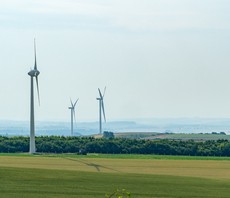Research: Renewables and nuclear help Britain avoid £15bn in winter energy costs


RenewableUK estimates low carbon power sources helped slash demand for costly fossil gas imports over winter period
Low carbon power sources made up over 60 per cent of Britain’s electricity over the entire winter period, saving consumers more than £15bn in energy costs by shielding them from expensive fossil gas imports, according to a new analysis from RenewableUK.
Figures released by the trade body yesterday show that from the start of November last year to the end of February 2023 renewables and nuclear generated almost two-thirds of Britain’s electricity.
Onshore and offshore wind turbines alone accounted for 60 per cent of Britain’s low carbon power over the period, with nuclear making up 26 per cent and the remainder provided by other sources such as solar, biomass, and hydro, according to RenewableUK.
Altogether, it estimates these low carbon power sources helped increase Britain’s energy security over the winter period by reducing demand for imported fossil gas by more than 9.7 billion cubic meters – or over 66 per cent of total LNG imports. It calculated that by avoiding increased imports clean energy saved billpayers around £15bn.
Ana Musat, executive director of policy at RenewableUK, said the figures showed that low carbon power, and wind and nuclear in particular, played “a central role in keeping the lights on this winter by providing the lion’s share of Britain’s electricity”.
With Europe and the world still reeling from the impacts of Russia’s ongoing war in Ukraine that has led to a surge in the price of fossil gas on the global market, Musat called for a rapid ramp up in renewable energy capacity in the coming years to support both energy security and climate goals.
“Reliable homegrown clean energy is boosting our energy security and saving hard-pressed British consumers billions of pounds in expensive gas imports, as well as moving us closer towards net zero,” she explained. “Now we need to ramp up the roll-out of new clean energy projects as fast as possible to maximise the benefits of renewables to billpayers and businesses in the years ahead.”
The latest data comes alongside further polling evidence highlighting the strong popular support among the UK public for more action to speed up the rollout of renewable energy capacity across the UK.
In a survey of almost 1,300 UK adults commissioned by charity Possible and carried out by pollster Omnisis in early March, 49 per cent said they wanted to see “more renewable energy projects like onshore wind and solar” to help drive down energy costs.
The proportion backing more renewables was even higher among respondents who said they intended to vote Conservative at the next General Election, of which 58 per cent voiced their backing for new renewables projects such as onshore wind and solar farms.
In contrast, just 20 per cent said they wanted to see storage facilities for fossil gas reopened, and only 15 per cent voiced their backing for fracking.
Meanwhile, 75 per cent of respondents said the cost of energy should be a factor in the decision on whether to allow new onshore wind farms – which are among the cheapest forms of new electricity sources available – to be built in England, according the poll findings.
There have been repeated calls to lift planning restrictions on new onshore wind farms that have been in place in England since 2015, and while the government is now consulting on changes that could loosen the rules somewhat, concerns remain among green groups that any resulting changes could be “so minimal as to be meaningless”.
There are hopes that the government could unleash a flurry of fresh investment, tax incentives, and policy measures in tomorrow’s Spring Budget to help accelerate the pursuit of its goal of a decarbonised power grid by 2035. The Treasury has already indicated the Budget will include plans to support a fleet of new nuclear power plants and £20bn of backing for carbon capture and storage (CCS) projects over the next 20 years.
But Aletha Warrnington, senior campaigner at Possible, said renewables offered the cheapest, quickest pathway to a decarbonised energy system, as she reiterated demands for the de-facto ban on new onshore wind farms in England to be lifted.
“One of the quickest ways to bring down the cost of energy would be to lift the ban on onshore wind, a source of power that was up to nine times cheaper than gas power last year,” she said. “As the Chancellor prepares his Budget, he should listen to the public calling for more support on household bills, and his own voters who know that renewables are the key to cleaner, cheaper energy, not funnelling billions into unproven technologies that lock in our reliance on expensive fossil fuels.”








